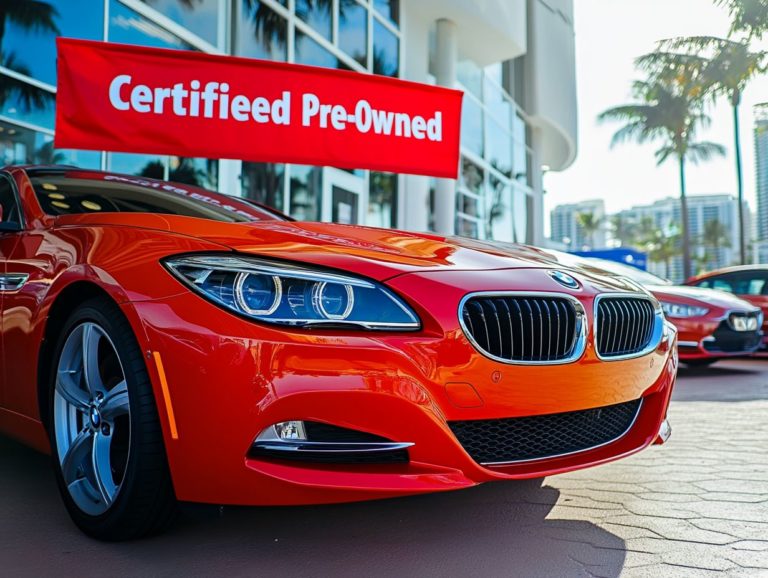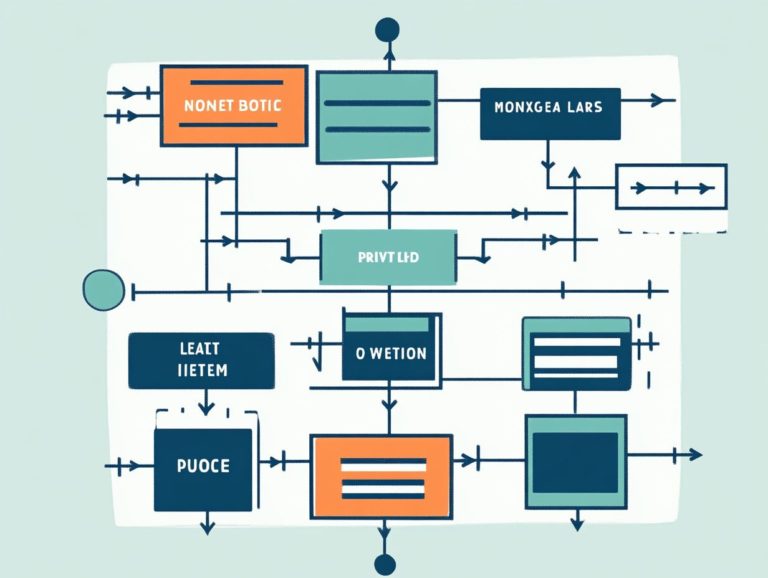5 Questions to Ask About Car Financing Options
Navigating the realm of car financing can indeed seem daunting, given the myriad of options at your fingertips. Whether you’re contemplating a purchase or a lease, it’s crucial to grasp the distinctions, as well as the pros and cons, that come with each avenue.
This article delves into five pivotal questions surrounding car financing options, designed to illuminate your decision-making process. From understanding current interest rates to avoiding common pitfalls, you will acquire the insights necessary to select the financing option that aligns seamlessly with your lifestyle and budget.
Contents
- Key Takeaways:
- 1. What Are the Different Types of Car Financing Options?
- 2. What Is the Difference Between Buying and Leasing a Car?
- 3. What Are the Pros and Cons of Each Financing Option?
- 4. How Can I Determine Which Option Is Best for Me?
- 5. What Are the Common Mistakes to Avoid When Choosing a Car Financing Option?
- What Should You Look for When Comparing Financing Options?
- Frequently Asked Questions
Key Takeaways:

- Understand the different types of car financing options to make an informed decision.
- Consider the pros and cons of buying vs. leasing a car to find the best option for you.
- Avoid common mistakes and compare key factors like interest rates and monthly payments.
1. What Are the Different Types of Car Financing Options?
When you’re considering purchasing a vehicle, it’s essential to grasp the various car financing options available to you. For those with less-than-perfect credit, exploring 5 ways to finance a car with bad credit can provide unique benefits and terms that significantly influence your car ownership experience and overall budget.
Traditional car loans from banks and credit unions often present competitive interest rates and the potential for lower monthly payments, particularly if you have a solid credit history. Meanwhile, online lenders are stepping up, offering convenient applications and swift approvals to make financing more accessible than ever.
If you value flexibility, leasing options might catch your eye. They typically result in lower upfront costs and give you the chance to drive a new car every few years. Look for rebates and incentives, like cash-back offers from manufacturers, as they can enhance affordability and make your financing decision even more crucial.
2. What Is the Difference Between Buying and Leasing a Car?
Deciding whether to buy a car outright or lease one requires a clear understanding of the key differences in monthly payments, vehicle ownership, and the overall costs tied to each option.
As you weigh these choices, it s vital to delve into the long-term financial aspects. When you purchase a vehicle, you ll eventually have full ownership, allowing you to build equity over time. Equity is the value of your car that you own outright.
On the other hand, leasing often comes with lower monthly payments, making it a more budget-friendly option in the short run. But remember, at the end of the lease, you ll have to return the vehicle, which means no ownership!
It s also important to consider the out-the-door price, which includes the total cost after taxes and fees, and to be mindful of any additional costs associated with leasing, such as mileage restrictions and wear-and-tear charges.
Each option has its own financial considerations. So, take the time to evaluate your personal budget and future vehicle needs to make the choice that best aligns with your circumstances.
3. What Are the Pros and Cons of Each Financing Option?
Evaluating the pros and cons of each financing option is crucial for making informed decisions that resonate with your financial situation and long-term car ownership aspirations, especially when considering resources like the top 5 questions to ask before buying a used car.
When you consider car loans, you often discover they offer full ownership, yet the interest rates can considerably affect your monthly payments. On the other hand, leasing a vehicle can present lower monthly costs and the excitement of driving a new model every few years. However, you may need to navigate mileage limitations and the reality of not owning the vehicle at the end of the lease term.
Potential trade-in values can dramatically shift the landscape, especially if your vehicle’s worth exceeds your expectations. Incorporating warranty deals into your plans can also provide peace of mind by offsetting repair costs, but it s essential to evaluate whether these expenses align with your overall budget.
By understanding how these various elements interact, you can more effectively navigate your options and select the route that will serve you best.
4. How Can I Determine Which Option Is Best for Me?

Determining the best financing option for your needs requires a thoughtful evaluation of several key factors. These include your budget considerations, driving habits, and a solid understanding of the vehicle’s history and ownership background. Additionally, it’s wise to explore the top questions to ask your dealer about financing.
Your budget is paramount. It dictates which financing solutions are viable while ensuring that monthly payments remain within a comfortable range.
Examine your driving habits to better assess fuel efficiency and maintenance costs. Both can significantly impact your overall ownership expenses.
The mileage and historical maintenance records of the vehicle are crucial. They offer insights into its future reliability and potential upkeep costs.
Resources like Kelley Blue Book can provide valuable insights into a vehicle’s fair market value. This knowledge empowers you to make informed decisions grounded in data rather than mere assumptions.
5. What Are the Common Mistakes to Avoid When Choosing a Car Financing Option?
Avoid common mistakes when selecting a car financing option. Implementing smart financing moves for avoiding car debt can save you a lot of money right away and reduce stress as you transition into car ownership.
- Many people overlook hidden fees that inflate the overall cost of their loan. Scrutinize the fine print.
- Misunderstanding contract terms can lead to unexpected complications later on.
- Neglecting to compare total costs from various lenders may result in less-than-ideal choices.
Consider the long-term implications of the loan, such as interest rates and penalties. By thoroughly evaluating financing options, you can make informed decisions that align with your budget and financial goals. This helps reduce the likelihood of future issues.
What Should You Look for When Comparing Financing Options?
When comparing financing options, consider key factors like the total cost of financing, monthly payments, interest rates, and any available trade-in value or applicable rebates. For a deeper insight, explore understanding used car financing options.
Analyze how varying interest rates can impact your monthly payments. Some options may be more affordable than others. Assessing trade-in values is essential. They can significantly offset the overall price of a new or used vehicle.
Rebates, often provided by manufacturers or dealerships, play a vital role in reducing your purchase price and long-term costs.
A comprehensive look at these elements will give you a clearer understanding of the true affordability of each financing option.
What Are the Current Interest Rates for Car Loans?
Current interest rates for car loans can vary significantly. They depend on factors such as the type of lender, your credit score, and prevailing market trends. This variability underscores the importance of shopping around for the best financing options.
Gather information from various sources. Credit unions often provide competitive rates, while online lenders can offer quick access to current rates. Comparing these options helps you understand how different interest rates affect your monthly payments and overall affordability.
Maintaining a strong credit score is crucial. It not only boosts your chances of securing lower rates but also enhances your overall financial health. This allows you to manage your budget more effectively and gives you greater control over your finances.
Start comparing your financing options today to find the best deal!
What Are the Down Payment Rules for Each Option?

Understanding down payment rules for various financing options is important, as it can significantly influence your monthly payments and the overall cost of your car loan.
When buying a vehicle, it’s typically recommended to aim for a down payment of around 20% of the total purchase price. Leasing a vehicle may require a down payment that ranges from nothing to several thousand dollars, depending on the dealership’s terms and the vehicle’s price.
The trade-in value plays a crucial role, as it can substantially reduce the required down payment. Making a bigger down payment lowers your monthly payments, which helps minimize the interest accrued over the life of the loan.
By grasping these factors, you can make informed decisions that align with your budget and financial goals.
What Are the Monthly Payment Differences Between Buying and Leasing?
The differences in monthly payments between buying a car and choosing to lease can significantly impact your budget, shaping your immediate financial commitments and your long-term vehicle performance.
As you evaluate these options, it s crucial to consider various factors, such as down payments, which can vary based on credit scores and promotions. Leasing often has the appeal of lower initial payments, making it attractive for those who want to minimize out-of-pocket expenses upfront. Interest rates are another key factor; if you finance through a loan with a higher rate, you ll likely face steeper monthly payments.
Don t overlook potential maintenance costs. Leased vehicles typically come with warranty coverage, sparing lessees from hefty repair bills. By understanding how all these elements interact, you can make an informed decision that aligns with your overall car affordability.
Are There Any Hidden Fees or Charges with Each Option?
Being aware of hidden fees or charges connected to each financing option is important for avoiding unexpected costs that can impact your budget and overall car ownership experience. For more insights, check out the top car financing websites to use.
These costs might include documentation fees that dealerships often sneak into the paperwork, maintenance expenses that aren t clearly disclosed, and excess mileage charges for leased vehicles that can significantly inflate your bills.
To navigate these potential pitfalls, it s crucial to conduct a thorough examination of the financing terms. Take the time to scrutinize every detail to better identify these fees and mitigate them effectively, ensuring a smoother and more financially manageable ownership journey.
What Are the Financing Terms and Conditions for Each Option?
Understanding the financing terms and conditions for each option is important to ensure your car ownership aligns with your financial goals. For instance, consider looking into the top 5 auto financing companies to find the best fit for your needs and expectations.
In both loan agreements and leasing contracts, key factors such as duration, interest rates, and payment schedules are pivotal. The duration of your loan or lease will directly impact your monthly payments and the total interest you pay over time. Interest rates can fluctuate significantly based on your credit score, which can greatly affect affordability.
Payment schedules offer clarity on when your obligations are due and play a crucial role in managing your cash flow. The vehicle’s features and condition also affect these terms. For example, opting for a newer model may mean higher payments but could also lead to better resale value. A well-maintained used vehicle might provide a more budget-friendly option without compromising quality.
Frequently Asked Questions

1. What are the different types of car financing options available?
- Traditional car loans
- Dealership financing
- Lease options
- Personal loans from banks or credit unions
2. How do I determine which car financing option is best for me?
Consider factors like your credit score and budget. Additionally, reviewing the essential checklist for car financing can help you think about how long you plan to keep the car to find the right loan choice.
3. Is it better to finance a car through a dealership or a bank?
Your situation will dictate the best option. Dealership financing provides convenience and special deals, while bank loans may offer lower interest rates.
Research and compare your choices to make a smart decision.
4. What are the benefits of leasing a car?
Leasing often means lower monthly payments. You can drive a new car every few years.
However, you won t own the car, and there may be mileage limits and fees if you exceed them.
Always read the terms carefully to avoid surprise fees. Don t miss out on understanding all potential charges before you sign!






